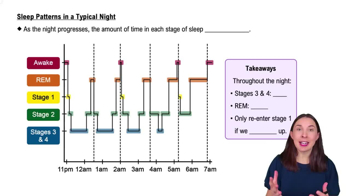Table of contents
- 1. Introduction to Psychology1h 43m
- 2. Psychology Research2h 20m
- 3. Biological Psychology2h 41m
- 4. Sensation and Perception28m
- 5. Consciousness and Sleep32m
- 6. Learning41m
- 7. Memory34m
- 8. Cognition37m
- 9. Emotion and Motivation35m
- 10. Developmental Psychology33m
- 11. Personality48m
- 12. Social Psychology41m
- 13. Stress and Health41m
- 14. Psychological Disorders44m
- 15. Treatment47m
5. Consciousness and Sleep
Sleep
Struggling with Psychology?
Join thousands of students who trust us to help them ace their exams!Watch the first videoMultiple Choice
Charles Darwin theorized that emotions were a product of _____ and, therefore, universal in nature.
A
culture
B
gender
C
evolution
D
age
 Verified step by step guidance
Verified step by step guidance1
Understand the context of the question: The question is about Charles Darwin's theory regarding emotions.
Identify the key concept: Darwin's theory suggests that emotions are a product of a certain factor and are universal.
Recall Darwin's contributions to psychology: Darwin is known for his theory of evolution, which posits that traits beneficial for survival are passed down through generations.
Connect the concept of evolution to emotions: Darwin theorized that emotions have evolved because they serve adaptive functions, helping individuals respond to environmental challenges.
Conclude that according to Darwin, emotions are a product of evolution, making them universal across different cultures and societies.

 3:25m
3:25mWatch next
Master Circadian Rhythms with a bite sized video explanation from Hannah Gordils
Start learningRelated Videos
Related Practice


































































































![Race, Genes and IQ Differences | Bret Weinstein [Mini Clip]](https://img.youtube.com/vi/IztL_m3pd70/mqdefault.jpg)



































































































